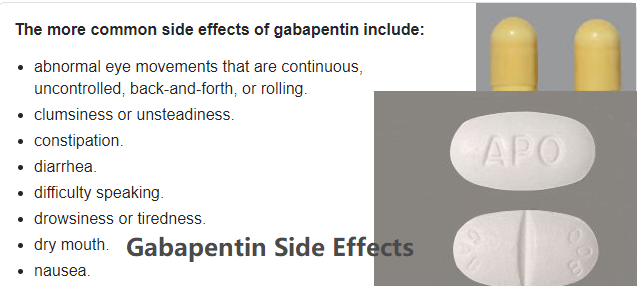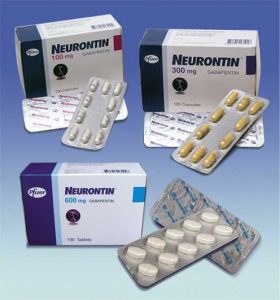Applies to gabapentin: oral capsule, oral solution, oral suspension, oral tablet

Along with its needed effects, gabapentin may cause some unwanted effects. Although not all of these side effects may occur, if they do occur they may need medical attention.
Check with your doctor immediately if any of the following side effects occur while taking gabapentin:
More common
- Clumsiness or unsteadiness
- continuous, uncontrolled, back-and-forth, or rolling eye movements
More common in children
- Aggressive behavior or other behavior problems
- anxiety
- concentration problems and change in school performance
- crying
- depression
- false sense of well-being
- hyperactivity or increase in body movements
- rapidly changing moods
- reacting too quickly, too emotional, or overreacting
- restlessness
- suspiciousness or distrust
Less common
- Black, tarry stools
- chest pain
- chills
- cough
- depression, irritability, or other mood or mental changes
- fever
- loss of memory
- pain or swelling in the arms or legs
- painful or difficult urination
- shortness of breath
- sore throat
- sores, ulcers, or white spots on the lips or in the mouth
- swollen glands
- unusual bleeding or bruising
- unusual tiredness or weakness
Incidence not known
- Abdominal or stomach pain
- blistering, peeling, or loosening of the skin
- clay-colored stools
- coma
- confusion
- convulsions
- dark urine
- decreased urine output
- diarrhea
- dizziness
- fast or irregular heartbeat
- headache
- increased thirst
- itching or skin rash
- joint pain
- large, hive-like swelling on the face, eyelids, lips, tongue, throat, hands, legs, feet, or sex organs
- loss of appetite
- muscle ache or pain
- nausea
- red skin lesions, often with a purple center
- red, irritated eyes
- unpleasant breath odor
- vomiting of blood
- yellow eyes or skin
Some side effects of gabapentin may occur that usually do not need medical attention.

These side effects may go away during treatment as your body adjusts to the medicine. Also, your health care professional may be able to tell you about ways to prevent or reduce some of these side effects. Check with your health care professional if any of the following side effects continue or are bothersome or if you have any questions about them:
More common
- Blurred vision
- cold or flu-like symptoms
- delusions
- dementia
- hoarseness
- lack or loss of strength
- lower back or side pain
- swelling of the hands, feet, or lower legs
- trembling or shaking
Less common or rare
- Accidental injury
- appetite increased
- back pain
- bloated or full feeling
- body aches or pain
- burning, dry, or itching eyes
- change in vision
- change in walking and balance
- clumsiness or unsteadiness
- congestion
- constipation
- cough producing mucus
- decrease in sexual desire or ability
- difficulty with breathing
- dryness of the mouth or throat
- earache
- excess air or gas in the stomach or intestines
- excessive tearing
- eye discharge
- feeling faint, dizzy, or lightheadedness
- feeling of warmth or heat
- flushed, dry skin
- flushing or redness of the skin, especially on the face and neck
- frequent urination
- fruit-like breath odor
- impaired vision
- incoordination
- increased hunger
- increased sensitivity to pain
- increased sensitivity to touch
- increased thirst
- indigestion
- noise in the ears
- pain, redness, rash, swelling, or bleeding where the skin is rubbed off
- passing gas
- redness or swelling in the ear
- redness, pain, swelling of the eye, eyelid, or inner lining of the eyelid
- runny nose
- sneezing
- sweating
- tender, swollen glands in the neck
- tightness in the chest
- tingling in the hands and feet
- trouble sleeping
- trouble swallowing
- trouble thinking
- twitching
- unexplained weight loss
- voice changes
- vomiting
- weakness or loss of strength
- weight gain
You can not take Prescription for a long time, you need find a way to treat your pain without prescription. Exercising is the best way to relieve your pain. because exercising can enhance your immune system and increase your muscle strength and make your nerve strong.
You can also take some natural nutritions to increase your immune system too. Some anti-aging products can also increase your immune ability. You can try USANA Products ro make you strong. I take USANA Essentials every day and I find my health get better and better. You can also try to become a usana distributor or associate and eat health organic food to get rid of your headache or nerve pain.
If you want to make yourself happy and more beautiful without any pain, please check Celavive Skin Care and Whitening Teeth